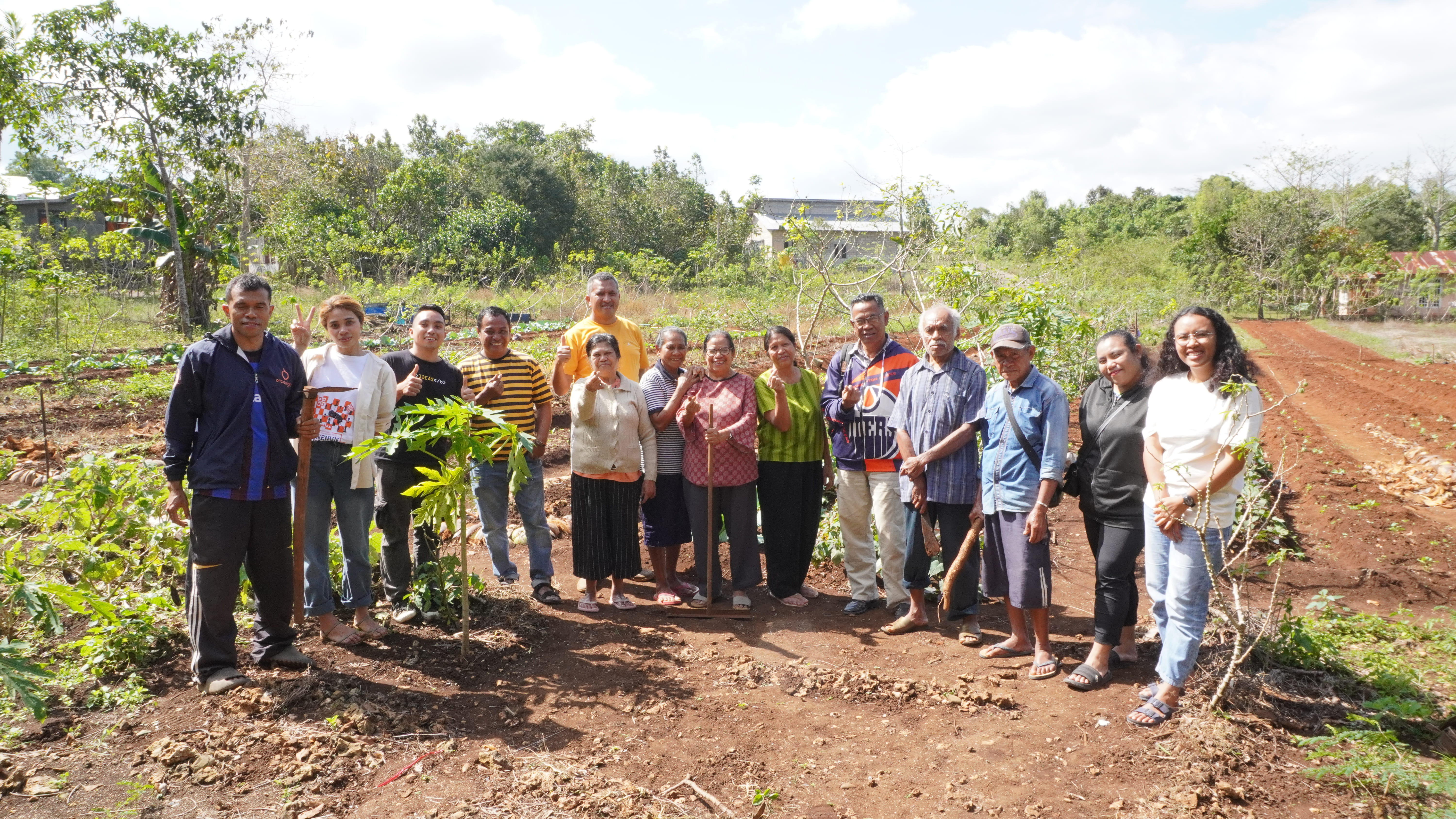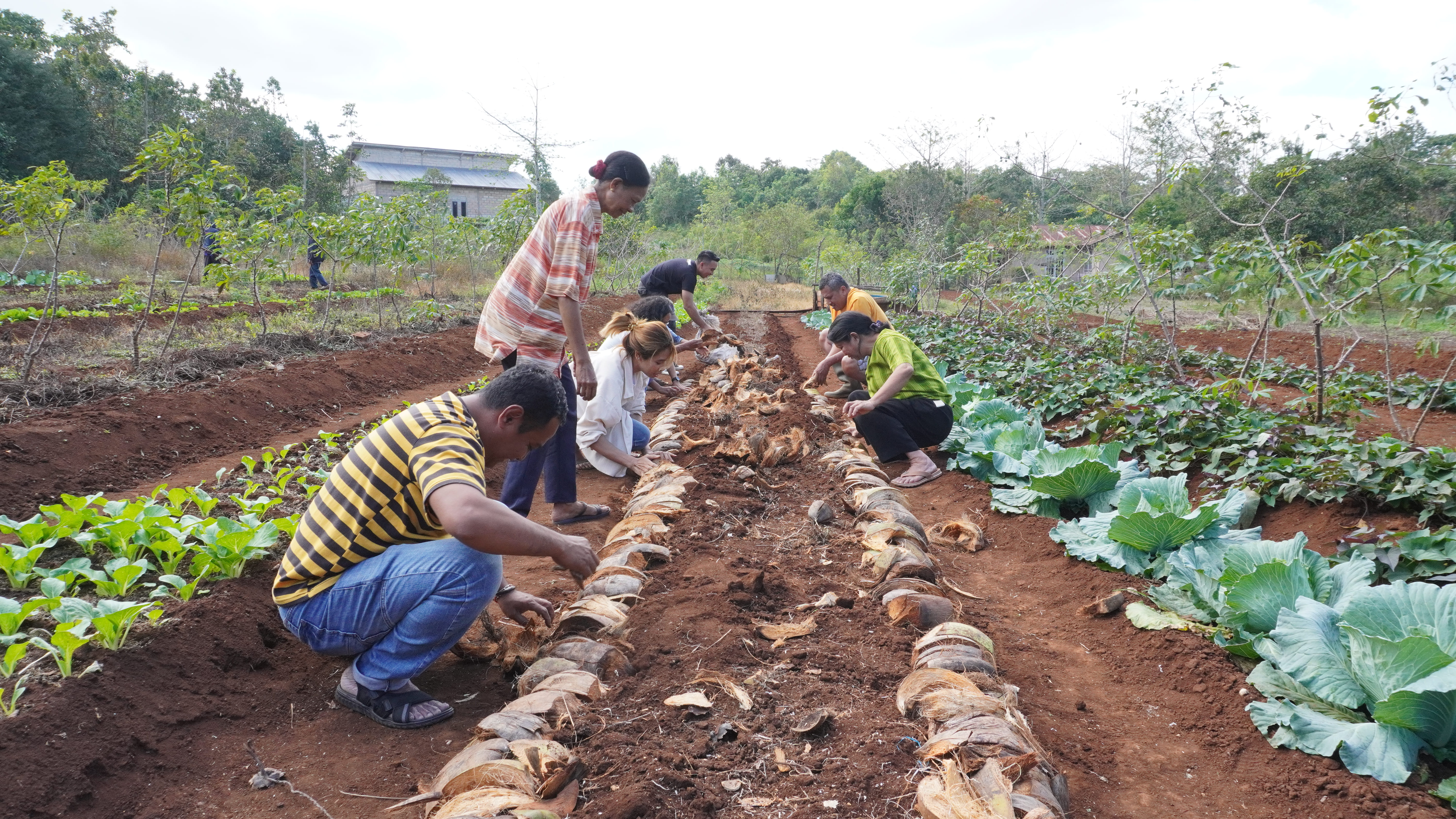
The Kopernik team with farmers at Tebes Kobelete Church Garden
In SoE, South Central Timor Regency, stands the Tebes Kobelete Church, a place of worship that has also become the heart of the community. Out of concern on how to meet the food needs of the congregation and wider community without relying solely on the market, Pastor Yandress and the church members found a strategic answer: turning the church’s garden into a source of nutritious food.
What started as an idea has since blossomed into the Tebes Kobelete Church Farmers’ Group. The community manages the garden not only as a source of food but also as a learning space, a place to foster solidarity, and a field to cultivate the congregation’s independence in managing and utilizing the harvest.
The land they manage has been damaged by decades of chemical use, yet 17 farmers take turns working the soil, learning, and sharing knowledge. With a strong spirit of learning, they partnered with Nusa Cendana University to test soil quality, consulted with agricultural extension officers, and experimented with natural farming methods. Gradually, the farmers began preparing plots and planting vegetables.
The first harvest was modest, but by the following season, the garden yielded a variety of crops, including carrots, mustard greens, cabbage, chili, eggplant, and tomatoes. Since June 2024, the harvest has been enjoyed four times by both farmers and the community. Some of the produce is shared with church members in need, some is used for church activities, and the rest is sold via WhatsApp stories, Facebook, or door-to-door. The goal is not large profits, but building independence and togetherness. The garden has helped reduce church expenses while also becoming a source of blessings within the congregation.
The dream of making the church garden to be more than just a food source is gradually becoming a reality. Through regenerative agriculture training with Kopernik, members of the Tebes Kobelete Church Farmers Group are learning planting techniques and sharing experiences with farmers from ten other villages. They are introduced to natural composting, crop rotation, climate-resilient local seeds, and processing harvests into value-added products.

The raised beds are constructed using coconut husks to prevent the soil from eroding during heavy rain.
One farmer, Cavik Adel, shared: “We realize that failing to grow crops is not the end. It is a call to keep learning, again and again.”
Currently, the farmers are applying what they have learned by enriching the soil with dried leaves as natural fertilizer, gradually reducing chemical fertilizer use that damages the land. They are also beginning to produce their own organic fertilizers, learning the right compositions. Some members, like Bapa Nitbani and Bapa Selan, are experimenting with turning agricultural waste — dried leaves, corn stalks, and pig manure — into soil-enriching materials. The results are visible: the mustard greens are growing fuller and healthier. They have also started applying natural pest control methods, such as watering plants with clean water in the evenings after rain.
Looking ahead, the farmers hope to develop natural pesticides in collaboration with farmers from other villages. The Tebes Kobelete Church Farmers Group envisions the church garden as a center for empowering the congregation. They hope that every church activity can be supported by the garden’s yield, fostering independence and reducing reliance on the market.
For the Pastor, the garden is not merely a food plot, but a means to build community, strengthen solidarity, and teach children the values of hard work and love for nature. With Kopernik’s support, this spirit of generosity expands, encouraging farmers to continue learning together and strengthening sustainable food security.
Behind every ripe tomato and flourishing mustard green lies a lesson in faith: diligence in planting is as noble as worship, and sharing the harvest is as sacred as sharing blessings. From damaged soil grows hope for a congregation that is independent, loving, and empowered across generations.


